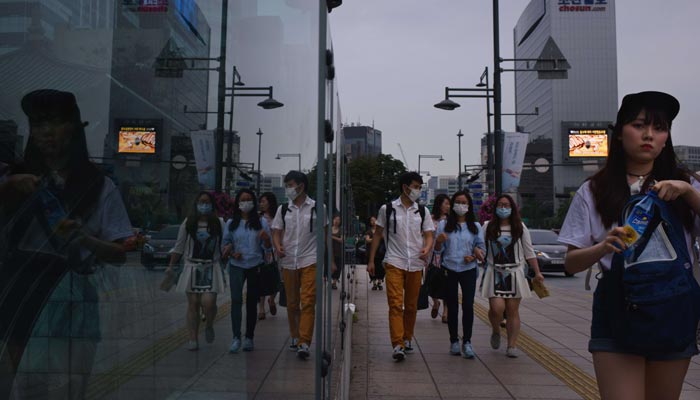Pedestrians, some wearing face masks, move along a street in Seoul on Thursday.
Reuters/Seoul
South Korea has ordered hospitals to track all emergency ward visitors, after a large outbreak of Middle East Respiratory Syndrome (Mers) was blamed on difficulties locating every person exposed to the disease, the health ministry said on Thursday.
Many of the 180 Mers cases in South Korea, which make up the largest outbreak of the disease outside Saudi Arabia, were caught from sufferers encountered in emergency wards before they were diagnosed, during a wait for hospital places.
The difficulty of tracing those who thronged the wards made it harder to find people who needed to be isolated for suspected exposure to the disease, ministry official Kwon Deok-cheol said.
"This issue has been raised as one of the biggest problems, as we looked at the trend of the Mers outbreak," Kwon, the ministry's head of health care policy, told a news briefing.
Hospitals are now required to keep a record of all patients and family members as well as ambulance workers and the time of their visits, the ministry said.
On Thursday, the ministry reported two more deaths from the disease, taking the toll to 29, besides reporting one new case.
Most of the deaths have been among elderly patients or those already suffering illnesses. There are 77 people still being treated in hospital, the ministry said.
The emergency ward at a prestigious Seoul hospital run by the Samsung Group had become an epicentre of the outbreak after a 35-year-old patient waited nearly three days for a bed while nearly 900 patients, their families, and other visitors, as well as hospital staff, went through the ward.
The health ministry has promised to change the practice of patients and their families waiting in emergency rooms for beds to become available.
Kwon declined to say if the new measure aimed to discourage patients and their families from visiting emergency wards, but said the ministry was reviewing a more permanent legal approach.
On Wednesday, the ministry said the outbreak was at a crossroads, backing off from an earlier assessment that the spread of disease had levelled off.
On Thursday officials said they were monitoring more than 2,000 people who had been in another Seoul hospital with a patient who was later confirmed as Mers positive.

